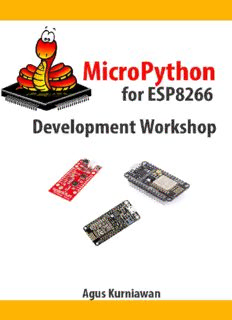
MicroPython for ESP8266 Development Workshop PDF
Preview MicroPython for ESP8266 Development Workshop
Copyright MicroPython for ESP8266 Development Workshop Agus Kurniawan 1st Edition, 2016 Copyright © 2016 Agus Kurniawan Table of Contents Copyright Preface 1. Preparing Development Environment 1.1 MicroPython Boards 1.2 Electronics Components 1.2.1 Arduino Starter Kit 1.2.2 Fritzing 1.2.3 Cooking-Hacks: Arduino Starter Kit 1.2.4 Arduino Sidekick Basic kit v2 1.2.5 Grove - Starter Kit for Arduino 1.2.6 DFRobot - Arduino Kit for Beginner v3 1.3 Development Tools 1.4 Testing 2. Setting Up MicroPython 2.1 Getting Started 2.2 Connecting MicroPython Boards to Computer 2.3 Flashing The Latest MicroPython Firmware 2.3.1 Windows Platform 2.3.2 Linux and OS X Platforms 2.4 Development Tools 2.4.1 Serial/UART Tool 2.4.2 WebREPL 2.5 Python programming 2.6 Hello MicroPython: Blinking LED 2.6.1 Wiring 2.6.2 Writing Program Using Serial/UART Tool 2.7 Uploading Python Script File to MicroPython Board 3. GPIO Programming 3.1 Getting Started 3.2 Wiring 3.3 Writing a Program 3.4 Testing 4. PWM and Analog Input 4.1 Getting Started 4.2 Demo Analog Output (PWM) : RGB LED 4.2.1 Wiring 4.2.2 Writing Program 4.2.3 Testing 4.3 Demo Analog Input: Working with Potentiometer 4.3.1 Wiring 4.3.2 Writing Program 4.3.3 Testing 5. Working with I2C 5.1 Getting Started 5.2 Writing Program 5.3 Writing Program 5.4 Testing 6. Working with UART 6.1 Getting Started 6.2 Wiring 6.3 Writing a Program 6.4 Testing 7. Working with SPI 7.1 Getting Started 7.2 Wiring 7.3 Writing a Program 7.4 Testing 8. Working with DHT Module 8.1 Getting Started 8.2 Wiring 8.3 Writing MicroPython Program 8.4 Testing Source Code My Books for ESP8266 Development Contact Preface This book was written to help anyone want to get started with MicroPython development for ESP8266 boards. It describes the basic elements of MicroPython development. Agus Kurniawan Depok, November 2016 1. Preparing Development Environment 1.1 MicroPython Boards MicroPython is a lean and efficient implementation of the Python programming language that includes a small subset of the Python standard library and is optimised to run on microcontrollers and in constrained environments. We can deploy MicroPython on ESP8266 boards. For instance, you can deploy on these boards: NodeMCU, http://nodemcu.com/index_en.html SparkFun ESP8266 Thing, https://www.sparkfun.com/products/13231 Adafruit HUZZAH ESP8266 Breakout, https://www.adafruit.com/product/2471 Adafruit Feather HUZZAH with ESP8266 WiFi, https://www.adafruit.com/product/2821 NodeMCU v2 board: SparkFun ESP8266 Thing. Adafruit HUZZAH ESP8266 Breakout. Adafruit Feather HUZZAH with ESP8266 WiFi.
Description: